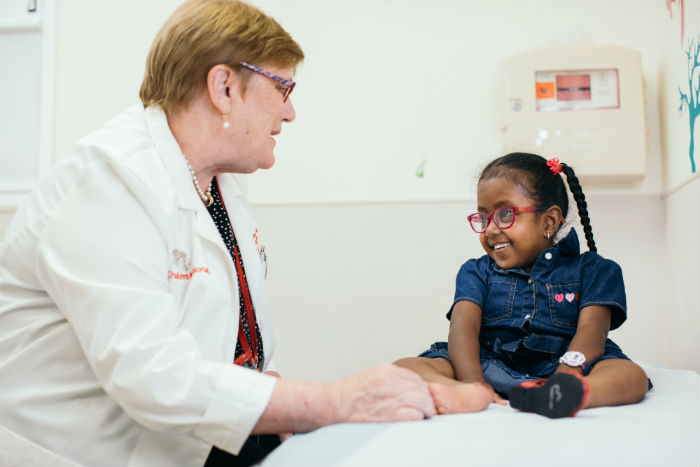Condition
Pediatric Hemophilia
What You Need to Know
Hemophilia is an inherited bleeding disorder. It causes an affected child to have low levels of blood clotting factors.
Key Symptoms
The most common symptoms of hemophilia are:
- Easy bleeding
- Heavy, uncontrollable bleeding
- Bruising
Diagnosis
Hemophilia is typically diagnosed by:
- Complete blood count (CBC)
- Clotting factors
- Bleeding times
- Genetic or DNA testing
Treatment
Treatment may include:
- Blood transfusions
- Surgery or immobilization for bleeding in the joint
- Self-infused factor VIII or IX
Children's National's experienced hematologists treat more than 200 patients with forms of hemophilia annually in the Comprehensive Hemostasis and Thrombosis Center.
The Patient and Family Support Program provides comprehensive mental health and psychosocial services and helpful resources for all patients treated in the Cancer and Blood Disorders Center, as well as patients, parents and siblings.
Schedule an Appointment
Our pediatric specialists provide personalized care for your child’s physical, mental and emotional health needs. Meet our providers and schedule an appointment today.
Frequently Asked Questions
Prevention and Risk Assessment
What is hemophilia in children?
What causes hemophilia in a child?
When should I call my child's health care provider?
Diagnosis
How is hemophilia diagnosed in a child?
What are the symptoms of hemophilia in a child?
Treatment
How is hemophilia treated in a child?
What are possible complications of hemophilia in a child?
How can I help my child live with hemophilia?
Meet the Providers Who Treat Hemophilia
Departments that Treat Hemophilia

Bone Health Program
Orthopaedists at Children's National offer world-renowned expertise and life-changing care, including surgery, for children at high risk for bone fracture.

Help Kids and Make a Difference
Invest in future cures to help children have brighter futures.








